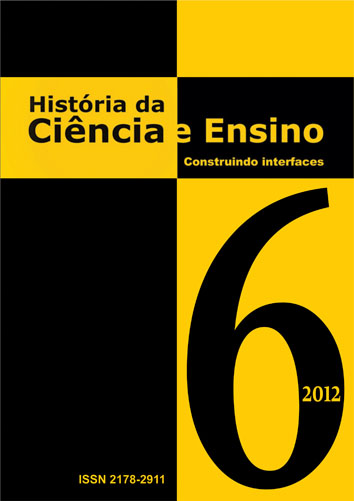Ciência e educação científica feminina no discurso de José Veríssimo (1857-1916)
Resumen
Resumo O trabalho tem por objetivo examinar o pensamento do escritor paraense José Veríssimo no que diz respeito aos estudos das ciências naturais e as suas idéias sobre educação científica feminina na transição do século XIX para o século XX, momento da transição do regime imperial para o republicano. Esse período foi selecionado, por ser o momento em que José Veríssimo escreveu seus livros e textos, como o livro A Educação Nacional, publicado em 1890, acerca da educação no país. Entusiasmado pelas idéias positivistas, evolucionistas e pelo republicanismo, o autor examina como se encontrava o estudo das ciências naturais na época de transição, já que para as doutrinas elencadas por Veríssimo era importante que escola tivesse um papel “iluminador” da sociedade e isso seria obtido através das ciências. Em seguida examino como a reforma na educação nacional ansiada por Veríssimo influenciou no modelo de ensino científico no qual a mulher brasileira deveria se submetida por ser a primeira educadora dos filhos. O autor indica um currículo a ser ensinado às mulheres para que melhor aprendessem as ciências. A pesquisa então assume relevância para a história da educação científica brasileira, já que contribui para conhecer as idéias de educação de José Veríssimo, um dos escritores brasileiros que mais se empenhou em fazer no país um elo entre o progresso e a educação. Abstract The study aims to examine the paraense writer José Veríssimo with respect to studies of the natural sciences and their ideas about science education of women in transition from the nineteenth to the twentieth century, time of transition from the imperial to the republican regime. This period was selected because it is the time when Jose Verissimo wrote his books and texts such as the book The National Education, published in 1890, about education in the country. Enthused by positivist, republicanism and the evolutionists ideas, the author examines how was the study of natural sciences at the time of transition, as to the doctrines listed by Verissimo was important that school had a role "illuminator" of society and that would be obtained through sciences. Then I examine how the national education reform longed Verissimo influenced by the model of science teaching in which the Brazilian woman should be submitted as the first educator of children. The author suggests a curriculum to be taught women to better learn the sciences. The research then is relevant to the history of Brazilian science education, since it contributes to hear the ideas of José Verissimo education, one of Brazilian writers who strove to do more in the country a link between progress and education.Descargas
Publicado
2012-12-13
Cómo citar
da Silva, L. V. A. (2012). Ciência e educação científica feminina no discurso de José Veríssimo (1857-1916). História Da Ciência E Ensino: Construindo Interfaces, 6, 49–70. Recuperado a partir de https://revistas.pucsp.br/index.php/hcensino/article/view/9969
Número
Sección
Tópicos de História da Ciência


